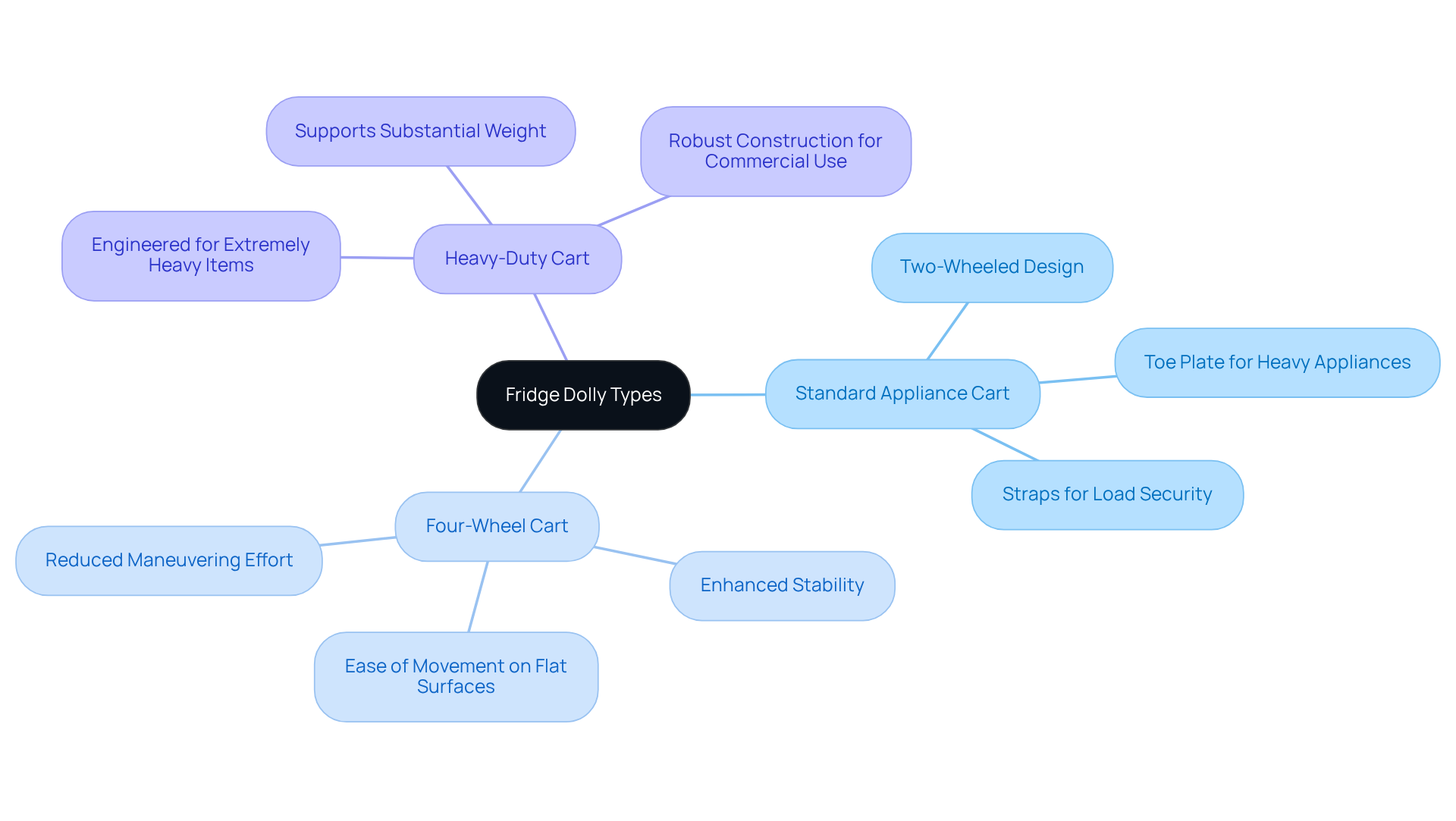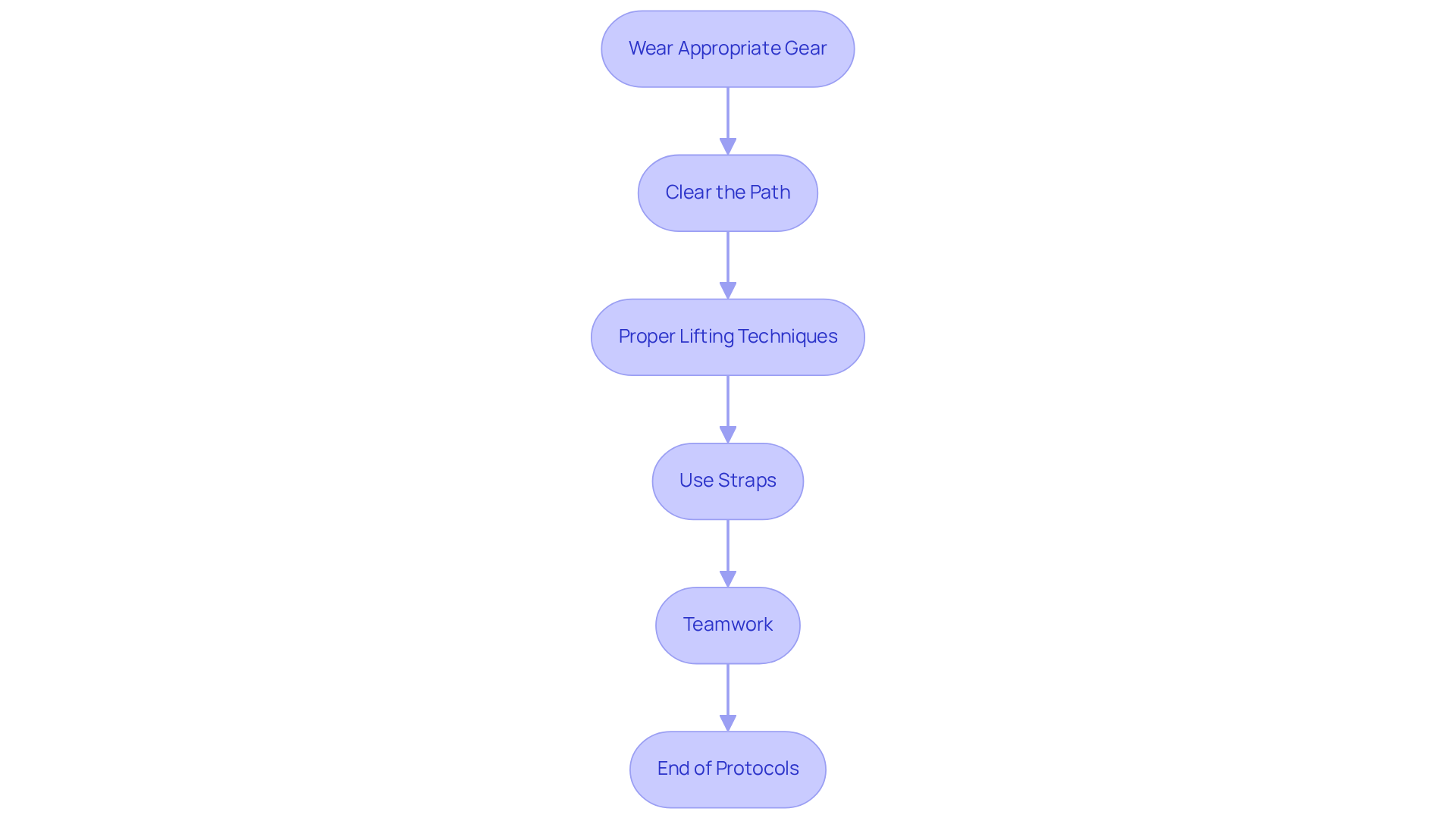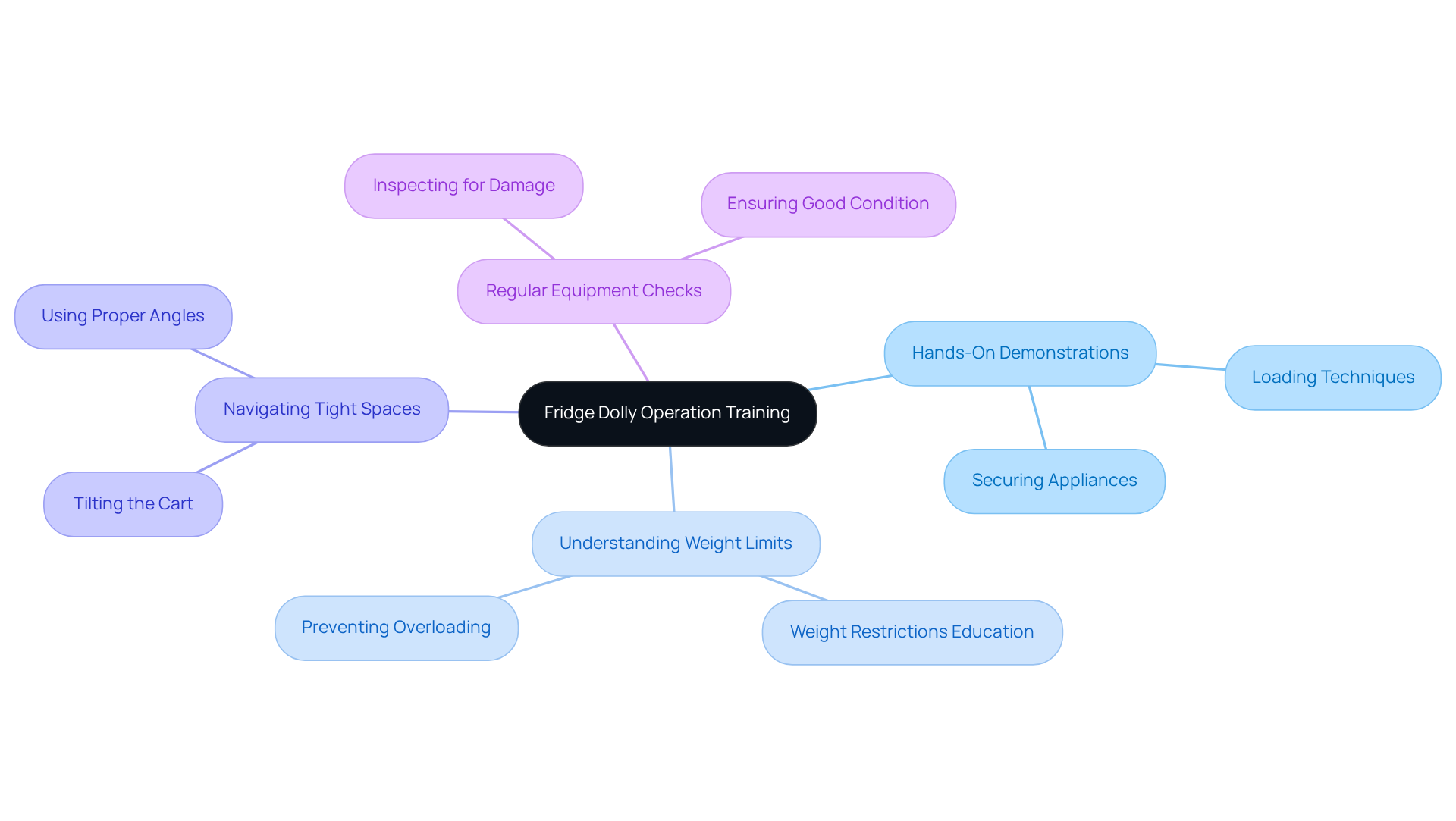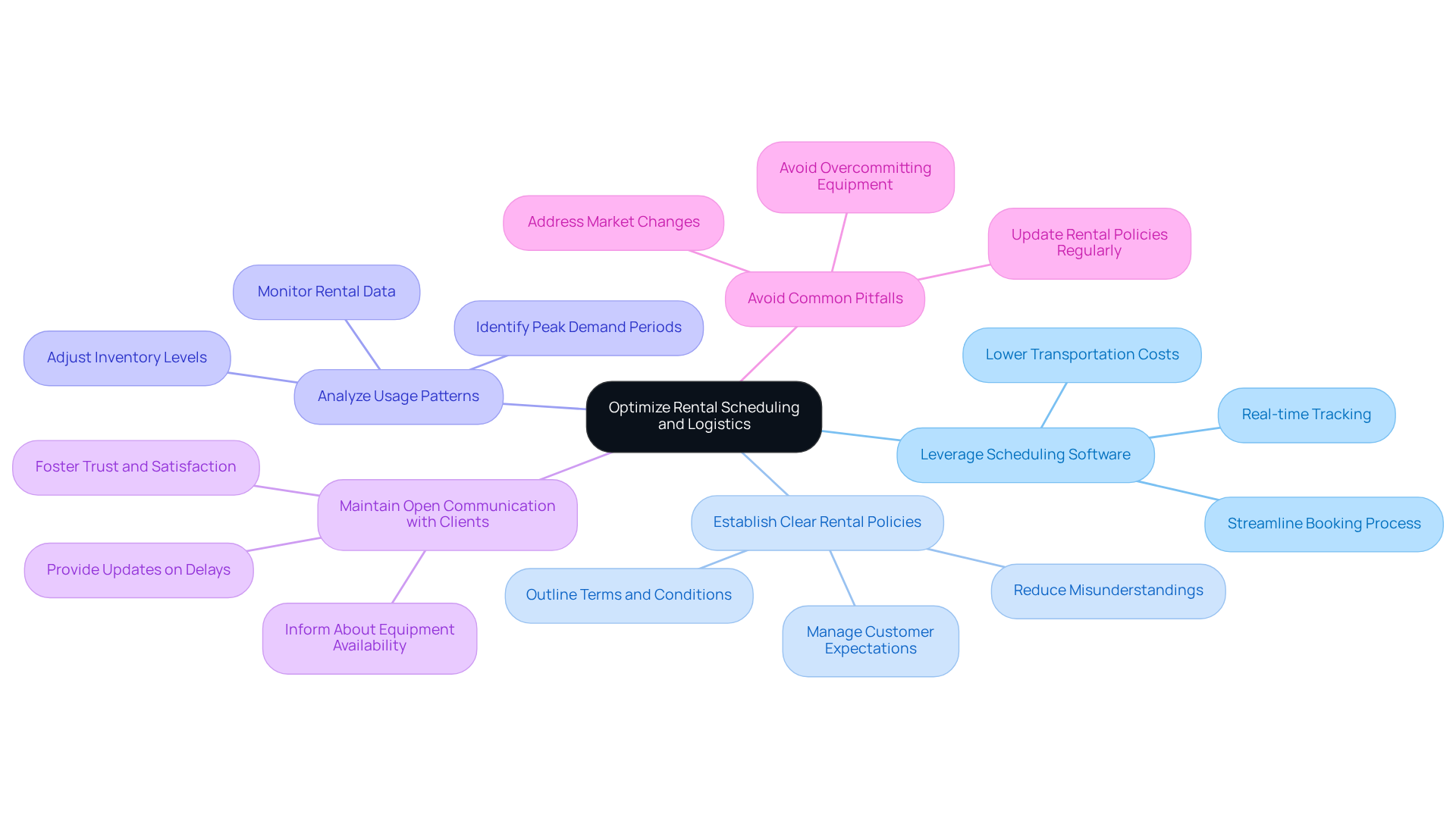Overview
To ensure efficient fridge dolly rental, four essential practices must be implemented:
- Understanding the types of fridge carts
- Enforcing safety protocols
- Training staff on proper operation
- Optimizing rental scheduling
Each of these practices plays a crucial role in enhancing operational efficiency. By detailing the specific applications of different cart types, businesses can select the most suitable equipment for their needs. Furthermore, emphasizing safety measures is vital to prevent injuries and ensure a secure working environment.
Training staff on the proper operation of fridge dollies is not just beneficial; it is imperative. Effective training techniques empower employees to handle equipment confidently and safely. This investment in staff development not only boosts morale but also enhances overall service quality. In addition, optimizing rental scheduling can significantly improve logistics and customer satisfaction, ensuring that equipment is available when needed and minimizing downtime.
By implementing these four practices, businesses can elevate their fridge dolly rental operations. The focus on understanding equipment types, safety, training, and scheduling creates a robust framework for success. It is time to take action and enhance your rental operations by adopting these essential practices.
Key Highlights:
- Fridge carts come in three main types: Standard Appliance Cart, Four-Wheel Cart, and Heavy-Duty Cart, each designed for specific applications.
- The Standard Appliance Cart is a two-wheeled cart for heavy appliances, featuring straps for secure transport.
- The Four-Wheel Cart offers stability and ease of movement for larger appliances, ideal for flat surfaces.
- The Heavy-Duty Cart is built for extremely heavy items, often used in commercial settings for reliable performance.
- Safety protocols for fridge dolly use include wearing appropriate gear, keeping paths clear, using proper lifting techniques, securing appliances with straps, and promoting teamwork.
- Training staff on fridge dolly operation involves hands-on demonstrations, understanding weight limits, navigating tight spaces, and conducting regular equipment checks.
- Optimising rental scheduling involves leveraging scheduling software, establishing clear rental policies, analysing usage patterns, maintaining client communication, and avoiding common pitfalls.
Introduction
Navigating the complexities of fridge dolly rentals can be daunting. With a variety of cart types designed for specific tasks, understanding the strengths of each dolly—ranging from standard appliance carts to heavy-duty options—is essential for ensuring the safe and efficient transport of appliances. However, safety protocols, staff training, and effective scheduling strategies are often overlooked.
How can businesses optimize their fridge dolly rental processes while minimizing risk and maximizing efficiency? This article explores four essential practices that can transform the fridge dolly rental experience into a streamlined and safe operation.
Understand Fridge Dolly Types and Their Uses
Fridge carts are available in a variety of types, each meticulously designed for specific applications. The most prevalent types include the Standard Appliance Cart, Four-Wheel Cart, and Heavy-Duty Cart.
The Standard Appliance Cart is a two-wheeled cart equipped with a toe plate, capable of handling heavy appliances such as refrigerators. This cart typically features straps to secure the load, ensuring safe transport.
Next, the Four-Wheel Cart is ideal for relocating larger appliances, offering enhanced stability and ease of movement, particularly on flat surfaces. This design significantly reduces the effort required to maneuver heavy items.
Lastly, the Heavy-Duty Cart is engineered for extremely heavy items, supporting substantial weight and often utilized in commercial settings. Its robust construction guarantees reliability, making it an essential tool for demanding tasks.
Selecting the appropriate cart type based on the appliance's weight and dimensions is crucial for safe and efficient transport. By understanding the strengths of each cart, you can ensure that your equipment is handled with the utmost care and efficiency.

Implement Safety Protocols for Fridge Dolly Use
To ensure safety when using fridge dollies, it is imperative to adhere to the following essential protocols:
- Wear Appropriate Gear: Staff must don closed-toe shoes and gloves to minimize the risk of injuries. Protective gear is crucial, as it significantly decreases the chances of accidents while managing tools. According to the Bureau of Labor Statistics, proper use of PPE can reduce workplace injuries by up to 60%.
- Clear the Path: Maintain a clear area free of obstacles to prevent tripping hazards. A well-organized workspace is essential for the safe transport of tools.
- Proper Lifting Techniques: Train staff to lift with their legs instead of their backs, keeping the cart close to their body. This technique is vital in preventing back injuries, which are prevalent in the industry.
- Use Straps: Always secure the appliance with straps to prevent it from shifting during transport. Properly securing loads is essential for avoiding accidents and ensuring safe handling.
- Teamwork: Encourage staff to work in pairs when moving heavy items. Distributing the weight reduces strain and enhances safety, as teamwork can significantly lower the risk of injury.
Implementing these protocols not only promotes a safer working environment but also aligns with the growing trend of companies prioritizing safety measures, such as fridge dolly rental, in equipment handling. The total cost of construction-related injuries and fatalities is estimated at $11.5 billion annually, underscoring the financial implications of neglecting safety measures. Furthermore, the PPE market is projected to reach $92.86 billion by 2027, reflecting the industry's increasing emphasis on worker safety.

Train Staff on Efficient Fridge Dolly Operation
Training staff on the efficient operation of fridge dollies is essential for ensuring safety and effectiveness in appliance handling.
- Hands-On Demonstrations are crucial; providing practical demonstrations on how to load and secure appliances on the cart not only enhances understanding but also builds confidence among personnel.
- Furthermore, Understanding Weight Limits is vital—educating staff about the weight restrictions of various hand trucks prevents overloading and ensures safe operation.
- In addition, Navigating Tight Spaces requires specialized techniques; teaching personnel how to maneuver carts in confined areas, such as tilting the cart and using proper angles, is key to avoiding accidents.
- Lastly, Regular Equipment Checks must be emphasized; instructing staff to examine carts prior to usage ensures they are in good condition, checking for any damage or wear that could compromise safety.

Optimize Rental Scheduling and Logistics
To enhance the efficiency of rental scheduling and logistics for fridge dolly rental, it is essential to implement effective strategies that drive success in the equipment rental industry.
- Leverage Scheduling Software: Implement advanced scheduling software that facilitates real-time tracking of resource availability and reservations. Industry insights indicate that effective logistics management can significantly lower transportation costs and maximize profitability. This technology is crucial for streamlining the booking process and enhancing logistics efficiency.
- Establish Clear Rental Policies: Develop comprehensive rental policies that clearly outline terms, conditions, and procedures for item returns. Such transparency is vital for managing customer expectations and reducing potential misunderstandings, which is particularly important in a competitive market.
- Analyze Usage Patterns: Regularly monitor rental data to identify peak demand periods. By analyzing usage trends, businesses can adjust inventory levels proactively, ensuring adequate resources are available during high-demand times. As logistics specialist Nitin Khanna emphasizes, assessing demand for tools is critical for improving inventory management.
- Maintain Open Communication with Clients: Keeping clients informed about equipment availability and potential delays fosters trust and satisfaction, which are essential for client retention. Prompt updates can significantly enhance the client experience, as highlighted by recent trends that stress the importance of client involvement in logistics.
- Avoid Common Pitfalls: It is crucial to be aware of common challenges, such as overcommitting equipment or neglecting to update rental policies in response to market changes. Addressing these pitfalls leads to smoother operations and improved client satisfaction.
By adopting these practices, rental businesses can optimize their scheduling processes, enhance logistics efficiency, and significantly improve overall customer satisfaction.

Conclusion
Understanding the essential practices for efficient fridge dolly rental is crucial for any business involved in appliance handling. By selecting the right type of dolly, adhering to safety protocols, training staff effectively, and optimizing rental logistics, companies can ensure safe and efficient operations. These practices not only enhance productivity but also contribute to a safer working environment.
Key insights discussed in the article highlight the importance of choosing the correct dolly based on the appliance’s weight and dimensions. Implementing rigorous safety measures to prevent injuries is paramount, as is providing comprehensive training to staff for efficient dolly operation. Furthermore, utilizing advanced scheduling tools and maintaining open communication with clients can significantly improve logistics and customer satisfaction.
Ultimately, prioritizing these practices can lead to substantial benefits for businesses in the appliance rental industry. Emphasizing safety, efficiency, and effective communication mitigates risks while fostering a culture of reliability and professionalism. By adopting these strategies, organizations can enhance their operational effectiveness and ensure a positive experience for both staff and clients alike.
Frequently Asked Questions
What are the main types of fridge dollies available?
The main types of fridge dollies include the Standard Appliance Cart, Four-Wheel Cart, and Heavy-Duty Cart.
What is a Standard Appliance Cart?
A Standard Appliance Cart is a two-wheeled cart with a toe plate designed to handle heavy appliances like refrigerators. It typically includes straps to secure the load for safe transport.
When should I use a Four-Wheel Cart?
A Four-Wheel Cart is ideal for relocating larger appliances as it offers enhanced stability and ease of movement, especially on flat surfaces, reducing the effort needed to maneuver heavy items.
What distinguishes a Heavy-Duty Cart from other types?
A Heavy-Duty Cart is engineered for extremely heavy items, supporting substantial weight and is often used in commercial settings. Its robust construction ensures reliability for demanding tasks.
Why is it important to select the appropriate cart type?
Selecting the appropriate cart type based on the appliance's weight and dimensions is crucial for safe and efficient transport, ensuring that equipment is handled with care.




